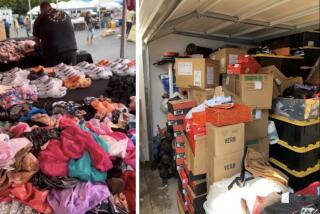GET-THIN brothers in fraud inquiry
The brothers behind the 1-800-GET-THIN ad campaign are the subjects of a criminal investigation involving several federal and state law enforcement agencies, according to a court filing.
The investigation is focused on numerous “potential violations of federal law, including conspiracy, healthcare fraud, wire fraud, mail fraud, tax violations, identity theft [and] money laundering,” Samanta Kelley, a special agent for the Food and Drug Administration’s criminal division, said in an affidavit filed at the federal courthouse in Los Angeles. She said the FBI was also involved.
Kelley’s statement was the first public acknowledgment of a broad criminal probe of companies behind the 1-800-GET-THIN advertisements that once blanketed Southern California roadside billboards, television, radio and the Internet. Michael and Julian Omidi, brothers who are listed in numerous lawsuits as the owners of the weight-loss business, are also subjects of the investigation, Kelley said in the filing.
One worker at a clinic affiliated with 1-800-GET-THIN has already been arrested.
Federal agents arrested Tiffiny Burrows, a licensed vocational nurse, after she tried to sell medical records about two patients who died after Lap-Band surgeries to an attorney who has filed several lawsuits against 1-800-GET-THIN, Kelley said in an affidavit filed in Burrows’ case.
The attorney, Alexander Robertson, reported the nurse’s offer to federal law enforcement officials. They gave him cash and ran an undercover operation that led to the woman’s arrest, according to the affidavit.
With undercover agents watching, Robertson carried $75,000 in cash to a park in West Los Angeles on June 7 and met with the nurse, who arrived carrying a box of documents. The nurse gave the documents to Robertson, who handed her a satchel stuffed with cash, according to the affidavit.
Agents then moved in and arrested the nurse. Burrows has pleaded not guilty. She is scheduled to stand trial Nov. 27 at the federal courthouse in Los Angeles.
Burrows’ attorney, Richard Goldman of the federal public defender’s office in Los Angeles, did not respond to a request for comment. FBI spokeswoman Laura Eimiller and FDA spokeswoman Morgan Liscinsky declined to comment, citing the ongoing investigation.
John Hueston, an attorney who represents the Omidis, said he was confident that no criminal charges would be brought against his clients. He noted that Kelley’s affidavit said that Burrows had considered using the documents to extort money from the Omidis, but instead decided to try to sell them to Robertson.
“The Omidi family has been the victim of an extortionist,” Hueston said Monday in an email. “We are confident that an investigation once very broad due to profiteering so-called whistleblowers such as Ms. Burrows will end without any action against the Omidis.”
Dan Chambers, an attorney for the surgery centers affiliated with 1-800-GET-THIN, said in an email that he was “outraged” by Burrows’ conduct.
“Her actions clearly violate the code of conduct for protection of patient records and confidentiality that the surgery centers have implemented,” Chambers said in the email. “We look forward to her actions and those of her accomplices being fully investigated and prosecuted by the appropriate authorities.”
He did not comment about the investigation of his clients.
Five patients died after Lap-Band procedures at clinics tied to the ad campaign between 2009 and 2011, according to autopsy reports, lawsuits and other public records.
Relatives of the dead patients alleged in wrongful-death lawsuits that 1-800-GET-THIN and its affiliated clinics failed to adequately warn patients about risks of the surgery and that doctors made numerous mistakes that led to the deaths.
1-800-GET-THIN removed the ads this year after receiving a warning from the FDA that the ads were misleading because they failed to include adequate warnings about the surgery.
Allergan Inc., the Irvine manufacturer of the Lap-Band, has said it would no longer sell the device to any companies affiliated with 1-800-GET-THIN. The toll-free number still connects callers to a recording that begins “Congratulations on taking the first step to reaching your weight-loss goals.”
In April, the Los Angeles Police Department said detectives from its Robbery-Homicide unit were investigating the Sept. 8, 2011, death of Paula Rojeski after Lap-Band surgery at Valley Surgical Center in West Hills. The investigation is ongoing.
Rojeski’s sister sued 1-800-GET-THIN, West Hills Surgery Center, three doctors and the Omidi brothers. The lawsuit alleges that defective medical equipment was used during Rojeski’s surgery and that medical records were falsified to hide mistakes that contributed to the woman’s death. The lawsuit is pending.
Attorneys for the Omidis and the clinics denied wrongdoing.
Two former workers had previously alleged in a lawsuit that 1-800-GET-THIN and the Omidi brothers had committed fraud by billing insurers for procedures that were never performed or were not medically necessary. That lawsuit is also pending.
Burrows, the nurse, told Robertson that the company had altered records related to Rojeski’s death and that she had the originals, which “are probably worth a lot of money to your case,” according to the affidavit.
She said she had worked for the company from 2008 until April of this year and had access to records that would be valuable in lawsuits filed against 1-800-GET-THIN, its affiliated clinics and the Omidi brothers.
With Robertson’s permission, federal agents set up an email account in his name and communicated by email with an attorney who said he represented the nurse, the affidavit said. The nurse’s attorney used a pseudonym, R.S. Criterden, but later used his real name, Darrell Erwin, the affidavit said.
“I have what I will phrase as the nuclear bomb in my possession. It will bring the Omidis to their knees in settlement discussions,” the attorney wrote in an email to Robertson. “This bomb, coupled with the other original documents in my possession, will assure that all of your cases settle.”
Erwin did not respond to requests for comment. He has not been charged in the case.
Burrows contacted Robertson directly on May 31, and the two communicated numerous times by telephone, email and text message, according to the affidavit. Robertson forwarded the nurse’s statements to law enforcement agents, the affidavit said.
In one phone call, monitored by federal agents, Burrows told Robertson that she had already given half of her documents to “the feds.” She said was willing to give all of her records to Robertson for a price.
“Give me a ballpark on what you can afford in cash or if you can give me something in cash and then tie me to the winnings in the end,” the nurse said, according to the affidavit. “I would like to give them to you, have you succeed, and me take the money and move on with my life.”
She initially requested $250,000 but later settled for the $75,000 that she accepted before her arrest, according to the affidavit.
The U.S. attorney’s office charged Burrows with two counts of selling protected health records. It is a violation of federal law to disclose a patient’s medical records to third parties without the patient’s authorization.
More to Read
Inside the business of entertainment
The Wide Shot brings you news, analysis and insights on everything from streaming wars to production — and what it all means for the future.
You may occasionally receive promotional content from the Los Angeles Times.











